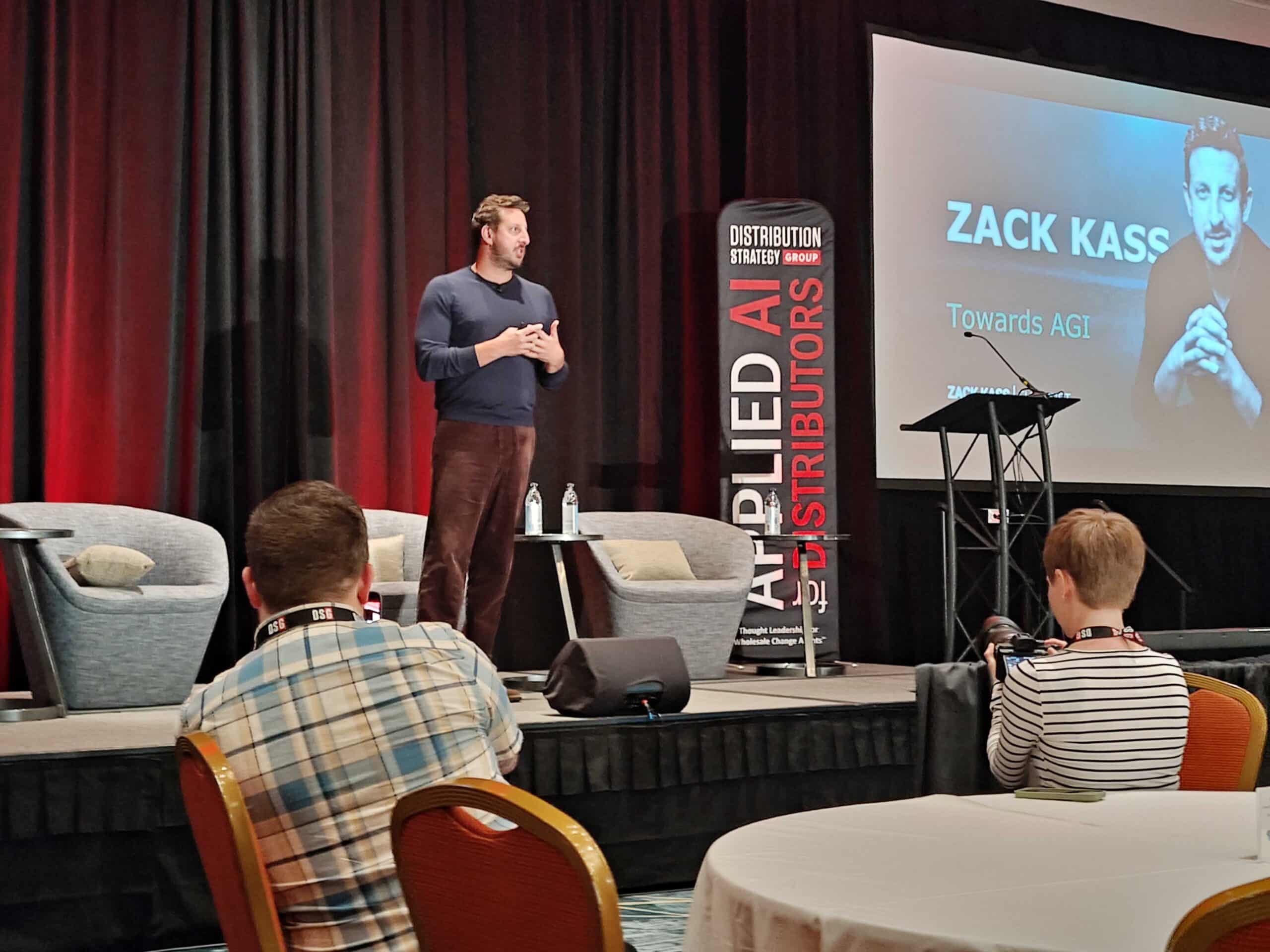“Today’s AI might be the Model T version, but we’ll have the 2024 Ferrari version before we know it.”
Ian Heller, Chief Strategy Officer of Distribution Strategy Group, said these words at the opening session of the 2024 Applied AI for Distributors in Chicago. While its current capabilities are impressive, AI — and what we’ll achieve by using it — is only going to get better.
The sentiment that every distributor should experiment with AI — even if AI is still imperfect — echoed throughout day one’s general sessions and breakouts.
From free versions of ChatGPT and Gemini to the dozens of tech solutions displayed at the event, distributors have many AI tools available today that can make a significant impact on their businesses.
Mixed in with the “what ifs” and the “we could” discussions among attendees, the day’s sessions also answered some questions and concerns on everyone’s minds.
Here are some key takeaways from the first 24 hours of our event focused on AI for distributors.

It’s time to embrace task-specific AI use cases available to distributors now.
Heller and Jonathan Bein, Ph. D., Managing Partner of Distribution Strategy Group, shared sales and marketing use cases that AI can make more efficient for distributors
- Product content management
- Improving customer retention
- Identifying cross selling opportunities
- Predicting reorders
- Quote automation
- Identifying substitutes
Using AI to remove manual, tedious and time-consuming tasks, distributors can save money, increase revenue and improve the customer experience.
We’re seeing slow but steady progress with AI adoption.
AI is a priority for distributors, but not THE priority, according to Mark Brohan, Senior Vice President, B2B & Market Research, Digital Commerce 360, who presented “Where AI is Heading in B2B Digital Commerce and Transformation, and What You Need to Know Now.”
A younger, more digitally native B2B buyer will dictate the terms of what they want, including a better user experience. AI will help distributors deliver what these buyers demand and reshape the user experience.
On average, today’s B2B buyer interacts with you on seven channels, Brohan said. AI can facilitate an expedited and smooth user experience across these channels. For example, eventually, product catalogs could be replaced by recommendation engines because that will be better, faster, cheaper and more effective.
AI is also instrumental in managing and cleaning up “dirty data,” which remains a significant challenge for many B2B organizations, especially online. Improved data quality leads to better decision-making and more transparent, efficient operations.
AI will make us more human – not less.
Heller and Bein discussed the real impact of AI on employees. Traditionally, new technology has created more jobs than it displaced, but there are still transition costs of getting people into new jobs. AI has the potential to do “almost everything,” Heller said.
Almost everything but orchestrating, said Bein. Humans are required to prompt AI tools and guide them to deliver the right outcomes.
As futurist and former go-to-market lead for OpenAI (maker of ChatGPT), Zack Kass emphasized in his presentation, “The Innovator’s Dilemma: Navigating Our AI Future,” that AI will strip humans of all our computational work, but there’s a bunch of stuff AI cannot do.
“What’s really fascinating about the next moment in human history is that it’s going to force us to become more human.”
At some point, AI will be able to do everything we can do intellectually and solve our discrete problems. However, when you think about how far we’ve come and how far we have yet to go, humanistic attributes such as courage, curiosity, adaptability, wisdom and empathy are the qualities that will get us there. The world is returning to a soft skill place.

Don’t fear AI: Understand how it works and how it can help you.
The best thing you can do in a world moving so fast is accept the rate at which the human race is evolving, said Kass. And that means learning how to learn.
For AI to be widely adopted, he said, it must breach a technology and societal threshold.
When the elevator was invented at the end of the 19th century, nobody took them. People didn’t want to get into a metal box held up by pulleys. While the technology threshold was met, the societal one wasn’t.
So, they started putting mirrors in elevators to distract us when we walked in. They added jazz music, which is known as “elevator music” today. They even put a human operator in them to run them all day, because if one person could be in the elevator all day without dying, perhaps others could, too. These tactics were intentional to relax humans into using elevators.
When the utility of AI outweighs the perceived cost, society will start to accept it as a part of everyday life and let go of the fear.
What’s your AI starting block?
Brohan encouraged attendees to simply “start someplace” with AI. Do you have a fundamental business problem or technology challenge where AI can help you achieve better results or drive greater efficiencies?
AI can facilitate the change your organization needs.
Kass said the first thing to consider is not when you should adopt this technology, but what you should adopt. He promised we “don’t need to do everything with it.” Just get started.


